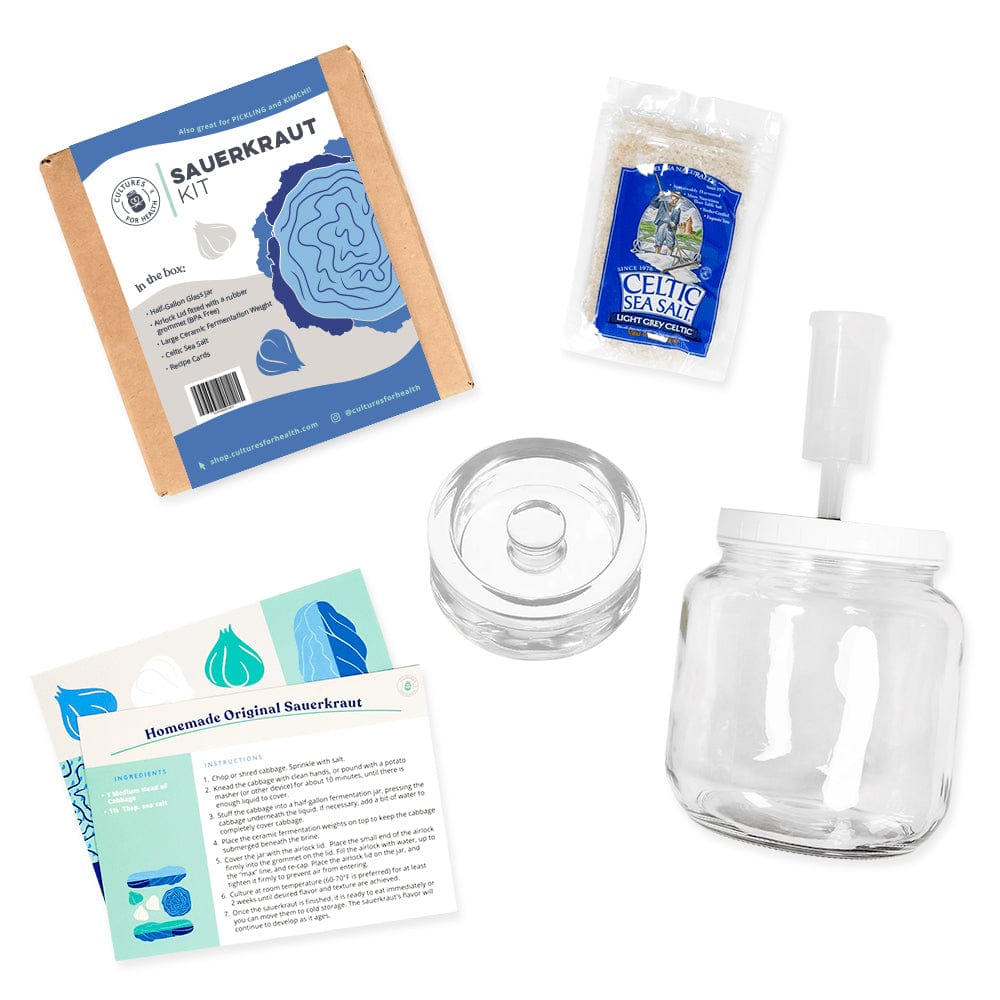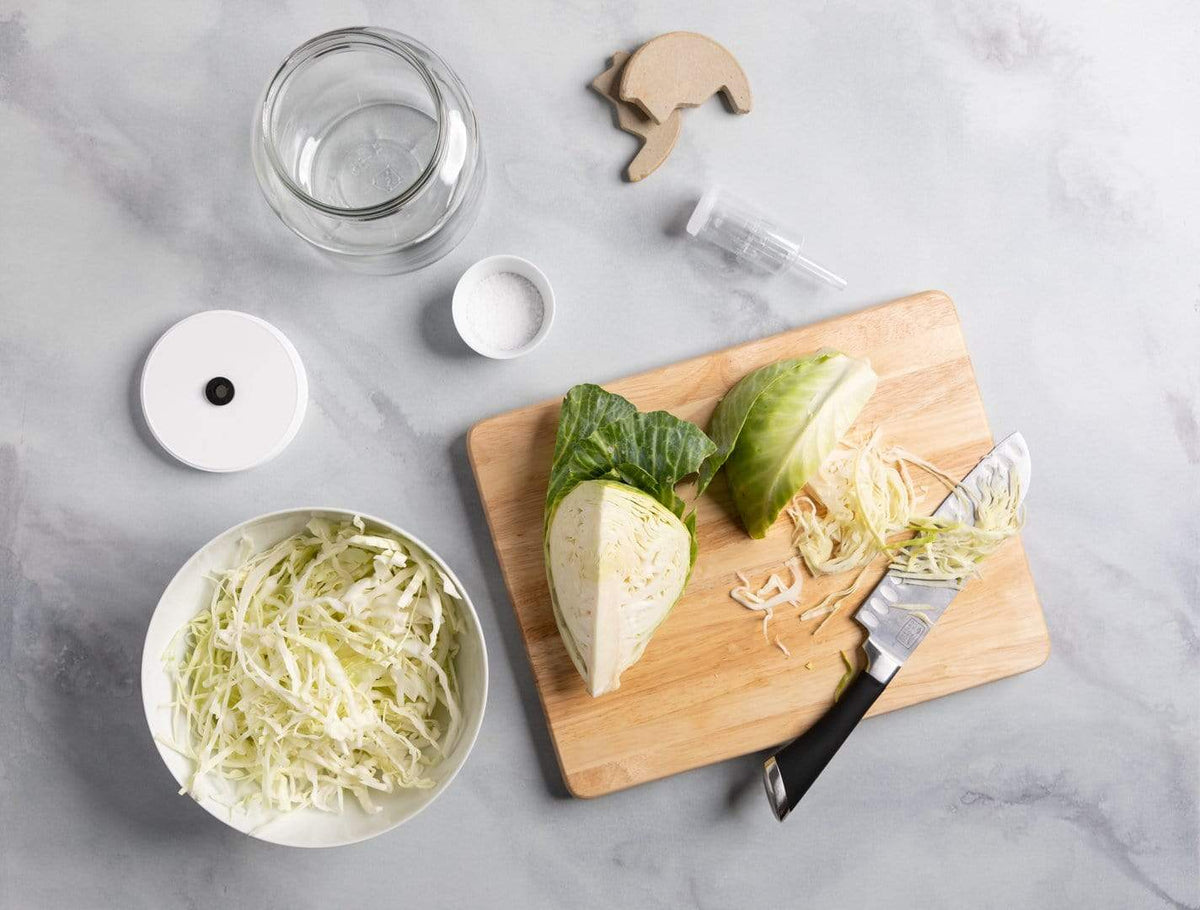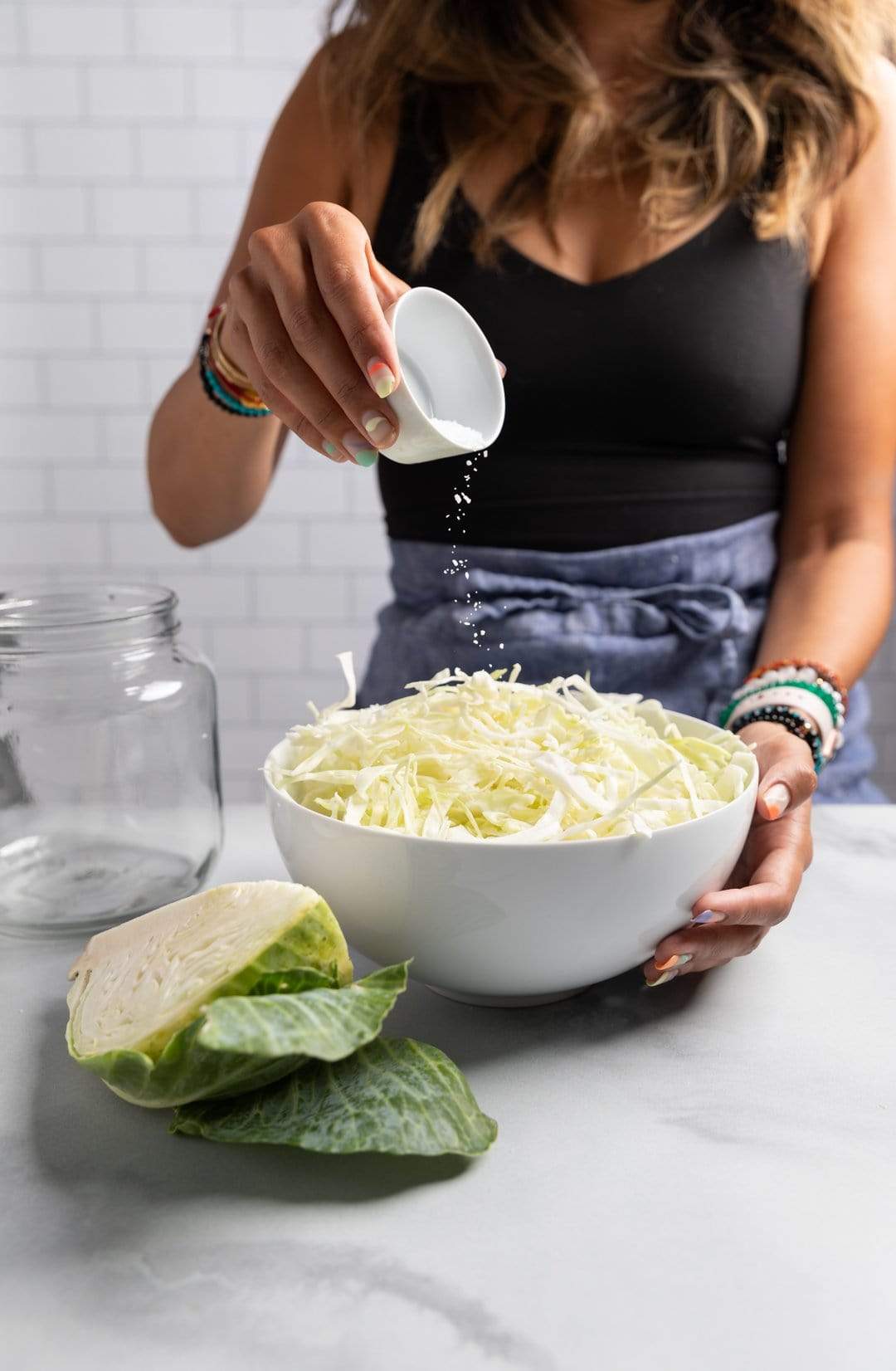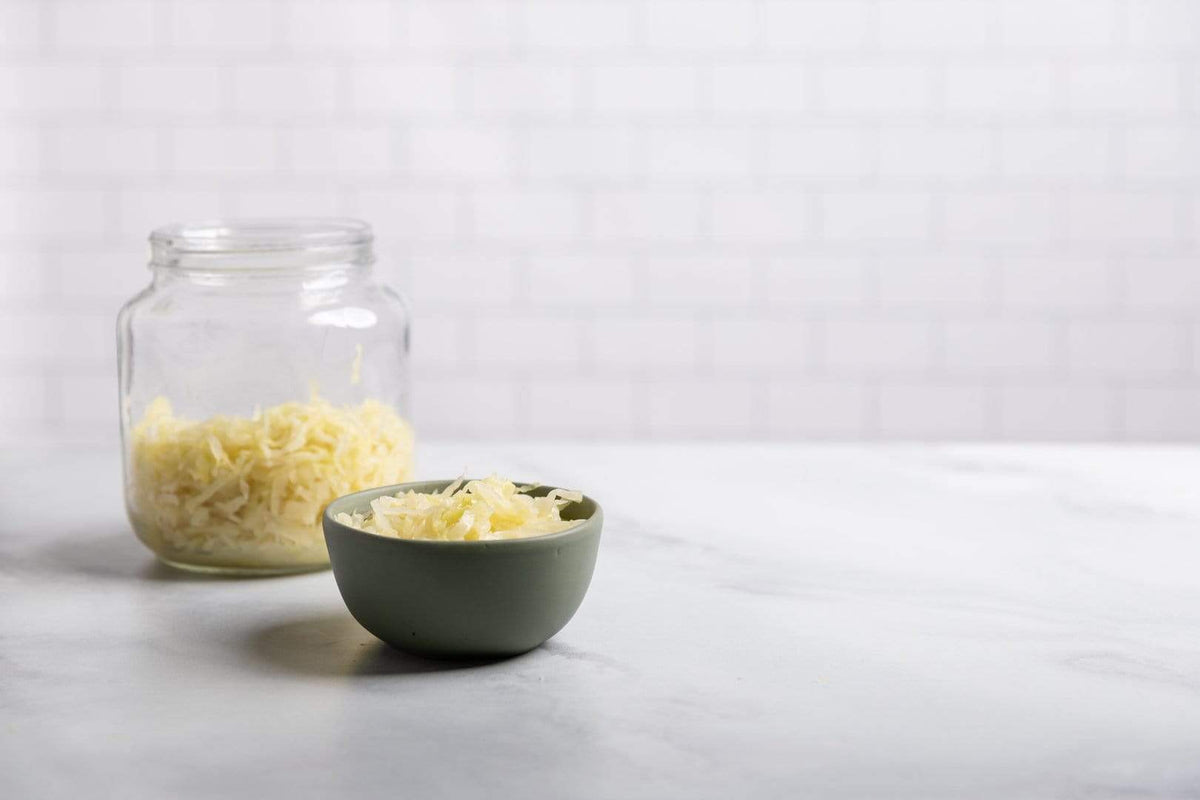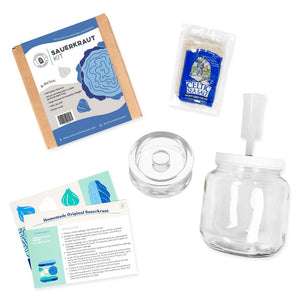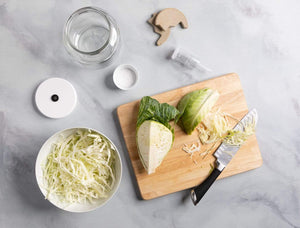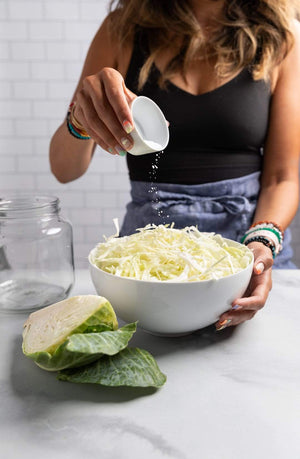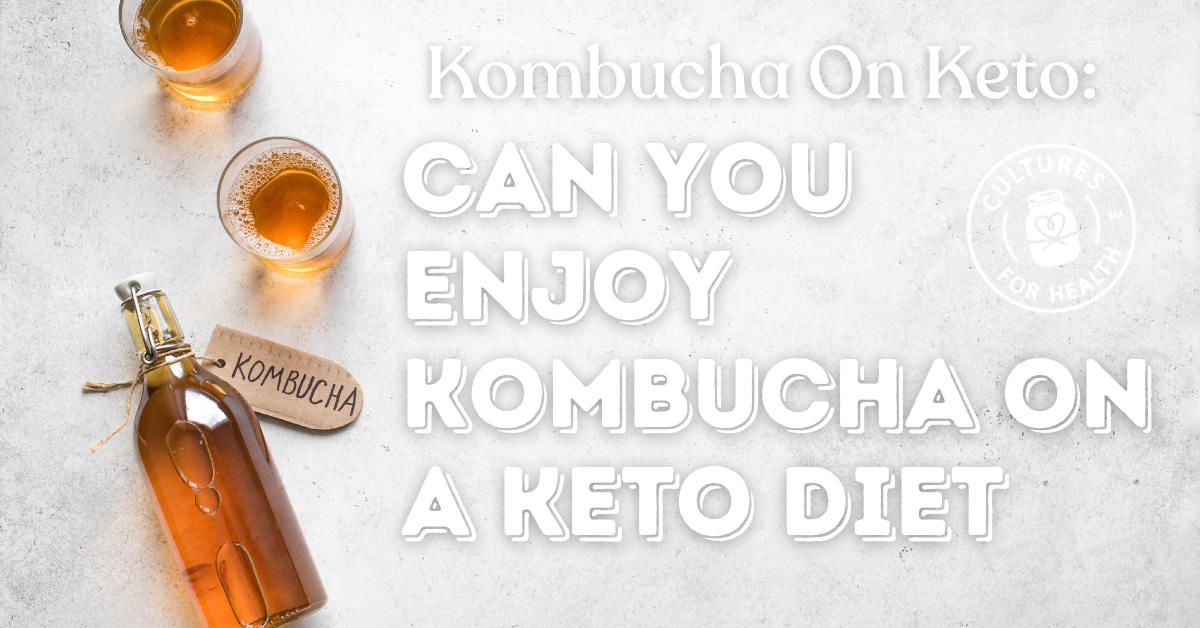
Although it originated in China almost 2,000 years ago, sauerkraut became popularized in Germany, hence its name—“sauer” meaning “sour” and “kraut” meaning “cabbage.”To prepare “sour cabbage,” the cabbage is first fermented. This fermentation results in the growth of probiotics or “live bacteria” commonly found in kefir or yogurt. This live bacteria, along with the fermentation process, gives sauerkraut its health benefits. The fermentation process creates lactic acid, which prevents unhealthy bacteria from growing on the cabbage. Thus, sauerkraut is able to stay “fresh” and edible throughout the fermentation process.
Download our Lacto-Fermentation Guide book today to learn more about the benefits of this healthy food and how to make delicious recipes with it.
Is Sauerkraut good for you?

Sauerkraut’s health benefits are many and varied. In addition to the nutritional value of cabbage, which is already full of fiber and vitamins when fresh, the fermentation process offers even more benefits. Let’s take a look at the advantages of sauerkraut for your health.
1. Sauerkraut Benefits Your Digestion

One of the most important benefits of sauerkraut is that it can improve digestion. It is a rich source of fiber that can help keep you regular. Not to get too descriptive, but for those with constipation, the fiber in sauerkraut helps increase the bulk and soften the stool. At the same time, it can help those with diarrhea, because the fiber content of sauerkraut absorbs the excess moisture; plus, the probiotics in live sauerkraut can help repopulate an unbalanced gut biome, which can often be a cause of stomach issues.
Besides, the probiotic content of sauerkraut improves your gut health, which promotes better absorption of vitamins and minerals. This also helps digestion a great deal.
2. Sauerkraut Can Help In Weight Loss

Obesity has become a worldwide epidemic, resulting in heart and digestive problems. Sauerkraut can make you feel full even without eating a lot of food, due to being high in fiber while also low in calories. Adding sauerkraut to your diet regularly can leave you feeling fuller longer, replacing some other empty calories you might be otherwise tempted to consume!
Additionally, certain types of probiotics have been found in studies to support weight loss.
3. Sauerkraut Contains Beneficial Nutrients
Sauerkraut is rich in vitamins and minerals, which are essential for the body. It contains vitamin C, vitamin K1, copper, potassium, iron, and manganese. Moreover, sauerkraut contains enzymes that help break down food into smaller molecules. This helps the body absorb all these nutrients more easily.
4. Sauerkraut Can Help Boost The Immune System

The body’s immune system depends a lot on gut health. Sauerkraut, through its beneficial bacteria, helps keep the lining of the digestive system healthy. This inflammation prevention can boost your body’s natural ability to keep undesirable elements from passing through the walls of the digestive system.
Probiotics also prevent the growth of harmful bacteria and boost the production of natural antibodies. As a result, the chances of infection are considerably reduced, especially the common cold and urinary infections.
In addition, the vitamin C and iron in sauerkraut support build the immune system. This helps make recovery times even shorter when you do fall ill.
5. Sauerkraut Promotes Heart Health
The fiber-rich property and presence of probiotics help sauerkraut regulate the cholesterol in the body. Moreover, sauerkraut is a rich source of potassium, which encourages the regulation of blood pressure.
The vitamin K2 present in sauerkraut helps prevent calcium deposits in the arteries. In one of the studies conducted, it was found that regular intake of Vitamin-K food significantly helps lower the risk of heart disease.
6. Sauerkraut Boosts Mental Health

There is a strong relationship between your gut health and mental health. The type of bacteria in your gut sends signals to your brain, thus influencing the way you think and act.
The probiotic bacteria found in sauerkraut stimulate mental health and may even help fight depression and anxiety by promoting a healthier gut balance. Fermented food also improves the uptake of mood-balancing micronutrients in your gut.
7. Sauerkraut Reduces the Risk Of Cancer
The cabbage in sauerkraut contains a rich compound called sulforaphane that prevents oxidative damage in the body. It also prevents cell mutation and blocks the excessive growth of cells. This protects against cancer, especially colorectal cancer.
How To Make Sauerkraut?

Sauerkraut is super easy to make. At its core you just need cabbage, salt, a jar, and time. We have a full sauerkraut recipe here—in short, it involves adding shredded cabbage and salt to a jar, packing it in really tightly and monitoring its fermentation to keep it going. Of course, you can also spice up your sauerkraut in all kinds of interesting ways. One of our favorites is this spicy sauerkraut recipe that’s great on a taco!
If you want to get a head start and know that you have everything you need, we also offer fermentation kits that make the whole process just a little easier.
Sauerkraut Making Kits
Can Everyone Eat and Benefit from Sauerkraut?
As it is free of dairy, gluten, and all other major allergens, yes, everyone can eat sauerkraut! The only caution is that if you are not used to a fiber-rich diet, jumping straight into eating a whole lot of sauerkraut can cause bloating and flatulence.
How To Eat Sauerkraut?
Since most sauerkraut has a strong flavor, it’s most commonly eaten on top of or alongside something else, but with the right recipe, sauerkraut can make a great dish all on its own! One important issue to remember is that cooking sauerkraut will kill off the probiotic bacteria that we want to consume. Even after cooking, sauerkraut is a healthy, cabbage-based dish, but it will be missing out on that probiotic boost. So, when possible, try to add your sauerkraut to your dishes uncooked.
Served on a hot dog, on a sandwich, mixed into some steamed vegetables, added to a rice dish or just in a bowl on its own, sauerkraut is a versatile addition to the kitchen.
If you want to branch out, you can try making sauerkraut’s Asian cousin, kimchi. If you’d like all the probiotic benefits of sauerkraut, but with a spicy Asian kick, our kimchi recipe is also fantastic. Click to know the answer of this question "Is kimchi gluten free?".
Conclusion: Sauerkraut has Numerous Health Benefits

Sauerkraut can be called a “superfood” that can improve your gut health. It also boosts your immune system and promotes heart and mental health. We always recommend fermenting your sauerkraut at home, but if you are buying sauerkraut at a store, you should check whether it is canned or pasteurized. The canning and pasteurization processes extend the shelf life of the sauerkraut, but kills most of the beneficial probiotic bacteria. So, if you must buy your sauerkraut, look in the refrigerated section of the grocery store—but if you’re up for it, making your own is super easy and super healthy.
Download our Lacto-Fermentation Guide book and start enjoying the benefits of sauerkraut and other recipes today!













